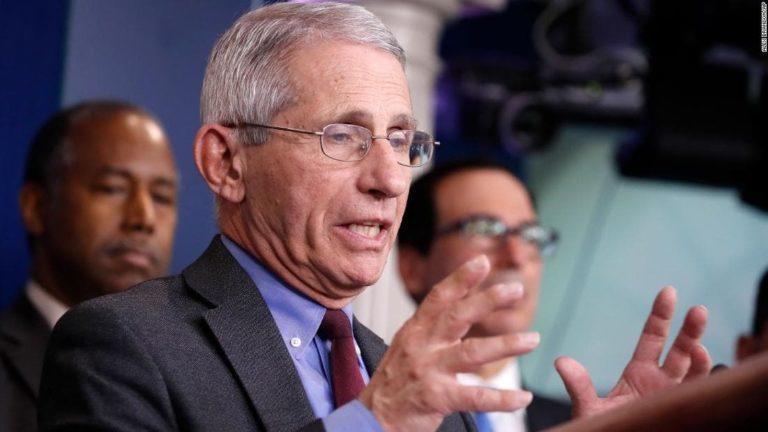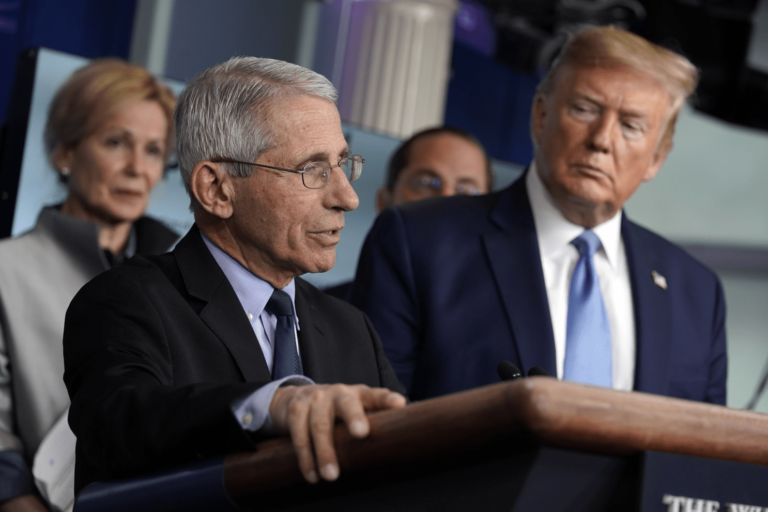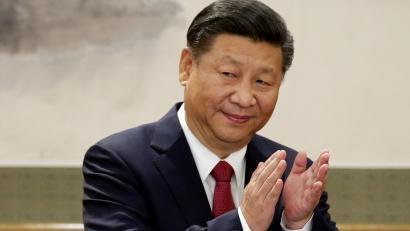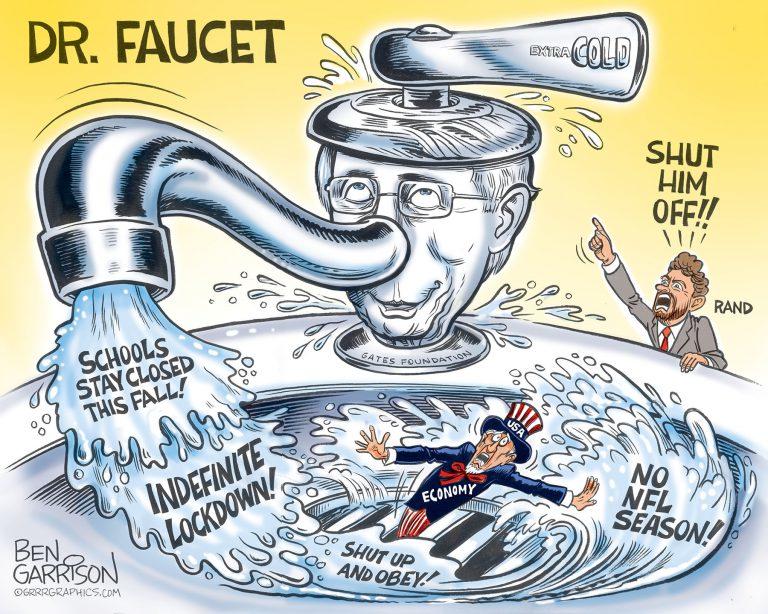The Full Fauci Timeline: Sorting Fact From Fiction
Tyler Durden
Thu, 05/21/2020 – 05:30
Authored by Kelli Ballard via LibertyNation.com,
Anthony Fauci’s name has become dinner-table familiar as people discuss the doctor’s warnings, his comments, and President Donald Trump’s responses to the COVID-19 pandemic. As usual, a firm line has been drawn between the left and right sides of the aisle: Some blame the president for all the world’s problems and declare Fauci the hero in this crisis; on the flip side, the doctor is the villain and the president has been misled and misinformed.
In truth, the whole Coronavirus fiasco has been a pile of convoluted, wishy-washy, contradictory information since the beginning. The blame game won’t fix anything, but perhaps stepping back to examine a timeline of facts and figures may bring clarity to the epic snarl of today’s social-distancing America.
Who Is Dr. Fauci?
Believe it or not, Fauci was once the captain of his high school’s basketball team in Manhattan’s Upper East Side. In 1962, he graduated from the College of the Holy Cross with a Bachelor of Arts in Classics. In 1966, he finished first in his class at Cornell University Medical College with a Doctor of Medicine. After completing his residency in internal medicine, he joined the National Institutes of Health (NIH) in 1968, becoming a clinical associate in the Laboratory of Clinical Investigation at the National Institute of Allergy and Infectious Diseases (NIAID). In 1974, he became the head of the Clinical Physiology Section and, by 1980, the chief of the Laboratory of Immunoregulation.
Fauci is no stranger to controversy surrounding his findings and methods. In the 1980s, he was one of the leading researchers during the AIDS epidemic. Protesters from the LGBTQ community believed he was ignoring them. A leading activist, playwright Larry Kramer, called him an “incompetent idiot” and a “pill-pushing tool,” although he has since changed his opinion. In 1984, Fauci became the director of NIAID and currently advises the president on the COVID-19 pandemic.
At 79, the doctor has advised six presidents on everything from HIV to biodefense drugs. Now, however, his credibility is coming into question as his contradictory statements and advice have confused the American people who want nothing more than to get back to the business of life.
The Fauci Timeline
Without going into conspiracy theories, this is a factual timeline of COVID-19 incidents, Fauci’s relevant comments, and the actions and statements of Trump and other members of his administration. As Liberty Nation’s Leesa K. Donner opined:
“As we take stock of where we are and how we got here, one name repeatedly pops up as a culpable character in this unholy mess: Dr. Anthony Fauci. There are more than a few people with an incipient suspicion that Fauci may have taken the president – and this country – for a ride. Thus, it’s worth asking if we the people have succumbed to the Great Fauci Fake-Out by shutting down America for something akin to the seasonal flu?”
First, Fauci seemed to predict this pandemic, or at least something similar, just after Trump took office:
Jan. 12, 2017: “And if there’s one message that I want to leave with you today based on my experience, and you’ll see that in a moment, is that there is no question that there will be a challenge to the coming administration in the arena of infectious diseases, both chronic infectious diseases, in the sense of already ongoing disease, and we have certainly a large burden of that, but also there will be a surprise outbreak.” [emphasis added]
Conspiracy theory? History repeating itself? The knowledge gained by the doctor? The timeline may give some insight.
It all begins with what is not so affectionately called the China Cover-up.
Dec. 16, 2019: The first Coronavirus patient was seen at Wuhan Central Hospital, according to Dr. Ai Fen.
Dec. 31: More than two dozen cases of Coronavirus were confirmed by Wuhan health authorities. Local wet markets were closed, and China informed the World Health Organization (WHO) about the “pneumonia” but said it had “found no obvious person-to-person transmission, and no medical personnel have been infected.” By this time, however, several health care workers had reportedly been infected. Also, Taiwan sent WHO an alert, claiming it was possible for the disease to transfer from human to human.
Jan. 1, 2020: The New York Times used cellphone data to discover that 175,000 people left Wuhan (seven million more over the next few weeks).
Jan. 6: Dr. Fauci begins interviews to discuss the Coronavirus outbreak.
Jan. 20: China’s President Xi Jinping issued the first public statement about the virus, saying it “must be taken seriously.”
Jan. 20: Fauci announced a Coronavirus vaccine was already being worked on by the National Institutes of Health.
Jan 21: In an interview, Greg Kelly of Newsmax asked Fauci how serious the virus was. The doctor urged everyone to take the precautions that the Centers for Disease Control and Prevention (CDC) put out, “but this is not a major threat for the people in the United States, and this is not something that the citizens of the United States right now should be worried about.”
Jan. 23: WHO Director-General Tedros Adhanom Ghebreyesus voted against declaring the outbreak a public health emergency on an international level; he was the deciding vote. Wuhan lockdown went into effect, but by this time an estimated five million people had already traveled through and left the city for other parts of the country and world.
Jan. 28: A Health and Human Services (HHS) press briefing included Fauci, Director of the CDC Robert Redfield, Director of the National Center for Immunization and Respiratory Diseases Dr. Nancy Messonnier, and Secretary of HHS Alex Azar. Azar warned that “Americans should know that this is a potentially very serious public health threat.”
Jan. 30: The Trump administration had a conference call with state governors, Fauci, Azar, and Redfield, among others, and produced an action plan for the outbreak.
Jan. 31: Trump imposed travel restrictions to and from China.
Feb. 8: Fauci said the risk of contracting the virus is “minuscule.”
Feb. 17: Fauci told USA Today that wearing a mask is for the infected to protect others. “Now, in the United States, there is absolutely no reason whatsoever to wear a mask.”
Feb. 20: WHO reported 77,000 COVID-19 cases worldwide.
Feb. 24: The Trump administration requested $2.5 billion from Congress to fight the Coronavirus. On the same day, House Speaker Nancy Pelosi (D-CA) toured San Francisco’s Chinatown, telling residents to support the neighborhood. “That’s what we’re trying to do today is to say everything is fine here,” she said. “Come because precautions have been taken. The city is on top of the situation.”
Feb. 29: The first Coronavirus death was reported in Seattle, WA.
Feb. 29: WHO said that it “continues to advise against the application of travel restrictions to countries experiencing COVID-19 outbreaks.”
Feb. 29: Fauci talks to the Today Show about “community spread” but “right now, at this moment, there is no need to change anything you’re doing on a day-to-day basis.”
March 9: Fauci tells reporters that young, healthy people can go on a cruise if they’d like. “If you are a healthy young person, there is no reason if you want to go on a cruise ship, go on a cruise ship.”
March 26: In an article for The New England Journal of Medicine, Fauci said, “… the overall clinical consequences of COVID-19 may ultimately be more akin to those of severe seasonal influenza (which has a case fatality rate of approximately 0.1%) or a pandemic influenza (similar to those in 1957 and 1968) rather than a disease similar to SARS or MERS, which have had case fatality rates of 9 to 10% and 36%, respectively.”
April 28: Fauci said he is hopeful that a vaccine will be developed by the winter.
April 30: Fauci said he is “almost certain” the virus will return in the winter, yet he is optimistic for a vaccine.
May 12: Fauci now says the likelihood of developing a treatment or vaccine by the fall is “a bridge too far.”
To be fair, the doctor did warn on several occasions that things could change if we reached “community spreading.” But, looking over the progress of Coronavirus in the United States and the responses of experts, is it any wonder that the American people are bewildered?
* * *
As “Summer Sausage” summed up so succinctly:
Fauci 2005: Hydroxycholoroquine is found to substantially reduce the corona virus load
Fauci 2020: Generic hydroxcholoroquine does nothing to reduce the corona virus load even though 50% fewer people taking it at NYU-Langone went to ICU. But expensive Remdisivir is amazing. Instead of 12 people dying, only 9 died!
* * *
Be sure to check LN’s China-WHO timeline for more facts.



